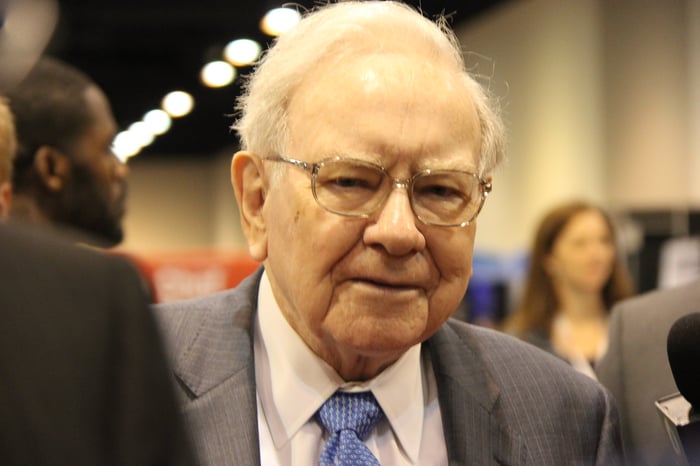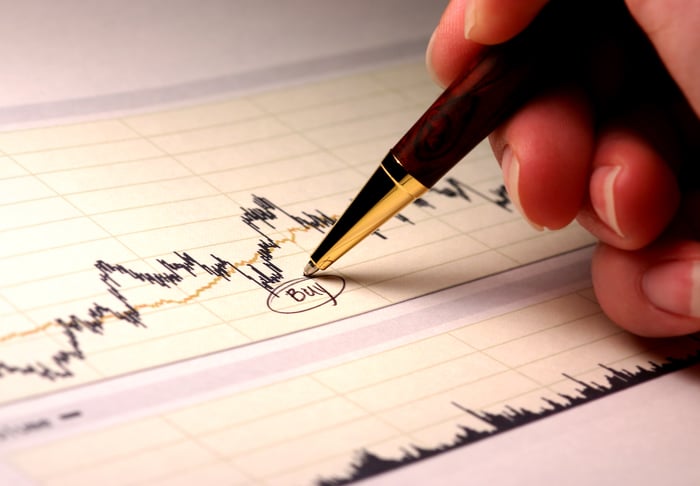|
|
|

|
|||||

|
|
Quarterly-filed Form 13Fs provide a way for investors to track the buying and selling activity of Wall Street's leading money managers.
Cost basis data in Berkshire Hathaway's latest quarterly results points to selling activity in two key areas -- with Bank of America stock likely on the chopping block, once again.
Meanwhile, all signs suggest that Warren Buffett is continuing to pile into a mystery stock.
Wall Street is a stomping ground for long-term wealth creation. However, no money manager has consistently generated outsized investment returns quite like Berkshire Hathaway (NYSE: BRK.A)(NYSE: BRK.B) CEO Warren Buffett.
As of the closing bell on Aug. 1, the appropriately nicknamed "Oracle of Omaha" had overseen a nearly 5,750,000% cumulative increase in his company's Class A shares (BRK.A) since becoming CEO six decades prior. This works out to a nearly 20% annualized return, which is almost double what the benchmark S&P 500 generated on an annualized total return basis, including dividends, over 60 years.
Where to invest $1,000 right now? Our analyst team just revealed what they believe are the 10 best stocks to buy right now. Continue »
Suffice it to say, Berkshire's billionaire chief has quite the following on Wall Street, with investors willing to mirror his trading activity and ride his coattails to big gains.

Berkshire Hathaway CEO Warren Buffett. Image source: The Motley Fool.
Normally, Form 13F filings are used to track Buffett's buying and selling activity. This is a required filing with the Securities and Exchange Commission that's due no later than 45 calendar days following the end to a quarter for institutional investors with at least $100 million in assets under management. It provides investors with a concise list of which stocks the brightest asset managers bought and sold in the latest quarter.
Although Berkshire Hathaway will file its 13F after the closing bell on Aug. 14, we don't have to wait that long to get a bead on what the Oracle of Omaha has been up to. Berkshire's recently filed second-quarter operating results have offered some big clues as to what's going on in the $281 billion portfolio Warren Buffett oversees.
There's not a sector Berkshire Hathaway's billionaire boss understands better than financials. Buying and holding bank stocks and insurance companies is a way for Buffett to take advantage of long-winded periods of economic growth.
However, Page 8 of Berkshire's first- and second-quarter operating results holds sizable clues as to what Buffett and his team have been doing on the trading front. In particular, the total cost basis for "Banks, insurance, and finance" stocks held in Berkshire's investment portfolio fell from $14.268 billion on March 31 to $14.08 billion on June 30. In other words, Buffett has continued to reduce his company's exposure to financial stocks.
The likeliest culprit is Bank of America (NYSE: BAC), commonly referred to as "BofA." Since July 17, 2024, Buffett has green-lit the sale of more than 401 million shares, equating to 39% of his company's peak stake in BofA.
During Berkshire Hathaway's 2024 annual meeting, Buffett implied that selling activity in Apple had to do with the belief that the peak marginal corporate income tax rate would rise at some point in the future. Thus, locking in sizable unrealized gains at a favorable tax rate would, eventually, be viewed as a smart move by investors. Three consecutive quarters of selling activity in Bank of America may represent nothing more than tax-based selling.
But it might also signal that Berkshire's brightest investment minds are concerned about the Federal Reserve's rate-easing cycle. BofA is the most interest-sensitive of America's largest banks by total assets. While it benefited immensely from the Fed's aggressive rate-raising cycle from March 2022 to July 2023, its interest income may be disproportionately hurt by future rate cuts.
In addition to Warren Buffett continuing to dump financial stocks, Berkshire Hathaway's cost basis data shows a notable pare down in "Consumer products." Between March 31 and June 30, the cost basis for this grouping fell from $13.76 billion to $13.418 billion.
This category is a bit trickier than financials because the Oracle of Omaha and his team have been active buyers of late. Specifically, Buffett and his team have purchased shares of Domino's Pizza and Pool Corp. for three consecutive quarters, and they've been adding pretty aggressively to alcoholic beverages company Constellation Brands.
We also know that Coca-Cola, the No. 4 holding in Berkshire Hathaway's investment portfolio at the time of this writing, is viewed as an "indefinite" holding by Warren Buffett.
The question is: What was sold?
While it's possible e-commerce giant Amazon was pared down, my best logical guess is that Buffett and his team took some chips off the table with grocery chain Kroger (NYSE: KR), which is up 56% since the start of 2024.
There's only so much juice that can be squeezed out of razor-thin grocery store margins. President Trump's tariff and trade policy throws potential monkey wrenches into the pricing power and operating margins of grocers.
Furthermore, Kroger is trading at an estimated 14 times forward-year earnings per share. Even though this represents a discount to the S&P 500's forward-year price-to-earnings ratio, it's a premium for Kroger considering the company's projected annual sales growth of just 1% to 3%.

Image source: Getty Images.
The final of three categories listed in Berkshire Hathaway's quarterly reports is "commercial, industrial, and other." Whereas the other two categories denote decisive selling activity, the cost basis for this segment rose from $49.097 billion on March 31 to $51.9 billion by June 30.
Despite being a net-seller of stocks for 11 consecutive quarters, we do know that Berkshire's boss has done some buying. The problem is this segment is composed of a wide swath of sectors, such as technology, healthcare, and industrials.
What's noteworthy is that Berkshire Hathaway's first-quarter 13F had at least one or more securities that were given confidential treatment by regulators. Confidential treatment allows a prominent money manager to build up a position in one or more stocks, with the goal of amassing a sizable position without investors driving up the price. For instance, when Berkshire's 13Fs reveal Buffett has purchased a new stock or added to an existing position, it's not uncommon for investors to pile into that stock and, at least temporarily, drive its share price higher.
Though it's possible we get some additional clarity on the mystery stock Buffett has been buying on Aug. 14, it's far likelier that the confidential treatment tag will remain in place as Berkshire Hathaway builds its position.
Based on the clues we've received from Berkshire's first- and second-quarter reports, I remain convinced that this confidential treatment stock is an industrial company, perhaps in the logistics space. Although tech stocks are hot and healthcare stocks are cheap, neither is Buffett's specialty.
Before you buy stock in Bank of America, consider this:
The Motley Fool Stock Advisor analyst team just identified what they believe are the 10 best stocks for investors to buy now… and Bank of America wasn’t one of them. The 10 stocks that made the cut could produce monster returns in the coming years.
Consider when Netflix made this list on December 17, 2004... if you invested $1,000 at the time of our recommendation, you’d have $635,544!* Or when Nvidia made this list on April 15, 2005... if you invested $1,000 at the time of our recommendation, you’d have $1,099,758!*
Now, it’s worth noting Stock Advisor’s total average return is 1,046% — a market-crushing outperformance compared to 181% for the S&P 500. Don’t miss out on the latest top 10 list, available when you join Stock Advisor.
*Stock Advisor returns as of August 4, 2025
Bank of America is an advertising partner of Motley Fool Money. Sean Williams has positions in Amazon and Bank of America. The Motley Fool has positions in and recommends Amazon, Apple, Berkshire Hathaway, and Domino's Pizza. The Motley Fool recommends Constellation Brands and Kroger. The Motley Fool has a disclosure policy.
| 7 hours | |
| 9 hours | |
| 10 hours | |
| 10 hours | |
| 10 hours | |
| 11 hours | |
| 11 hours | |
| 13 hours | |
| 14 hours | |
| Feb-23 | |
| Feb-23 | |
| Feb-23 | |
| Feb-23 | |
| Feb-23 | |
| Feb-23 |
Join thousands of traders who make more informed decisions with our premium features. Real-time quotes, advanced visualizations, backtesting, and much more.
Learn more about FINVIZ*Elite